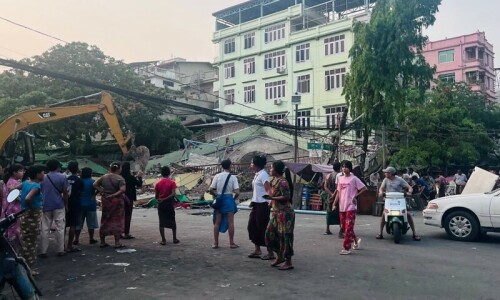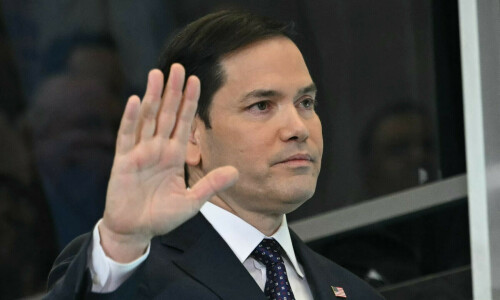WASHINGTON: Foreign Minister Shah Mehmood Qureshi met his US counterpart Mike Pompeo on Friday and shared with him the details of his recent visits to Iran and Saudi Arabia, said a statement issued by his office.
The meeting, held at the US State Department, also reviewed the security situation in the greater Middle East region and Pakistan’s efforts to help promote peace and stability in Afghanistan.
Speaking at the Centre for Strategic and International Studies (CSIS) in Washington on Thursday, Mr Qureshi spoke about his visit to Tehran and asked Washington not to increase economic and political pressure on Tehran as this would become “counter-productive”.
Asked what he learned in Tehran about the US-Iran conflict, the foreign minister said: “Escalation is not just dangerous. It can be disastrous. They (Iranians) are in no mood for conflict. They do not want a war.”
FM, Pompeo discuss Pakistan’s efforts for peace in Middle East
The Iranians, he said, felt that enough blood had been shed but they were also saying that the sanctions imposed on Iran were hurting the ordinary people. Mr Qureshi said he felt the Iranians realised that “the policies they have been following are pushing them into some kind of an isolation and that’s not good for them. So, it’s time to re-engage”.
“If it’s time to re-engage, they will have to revisit some of the policies that they were pursuing. What I deduce from the conversations that I had there is that they are willing to do that.” The Iranians, he said, were willing to talk to all countries in the region and had identified areas of difference that they wanted to talk about.
Asking America to reconsider its policies, the foreign minister urged Washington to ‘encourage’ Tehran’s willingness to talk.
“Pressure, I think, has been exercised, a clear message has been sent, but pressure beyond a certain point can be counter-productive. They can lead to a reactionary and reckless mode and I think that should be avoided,” he said.
At the State Department briefing, the foreign minister informed the US secretary of state that “Pakistan is determined to play its role for ending tensions in the region,” the statement said. Mr Qureshi also informed Mr Pompeo how India continues to commit grave human rights violations in held Kashmir and how a curfew has forced the Valley’s eight million people to live in constant confinement for the last five months.
He said that Pakistan shared America’s dream for a peaceful South Asia but the “dream cannot be fulfilled if India continues to deny the right of self-determination to the people of Kashmir, a right that also has been guaranteed by the United Nations,” the statement added.
Mr Qureshi noted that Pakistan and America’s joint efforts had brought Afghanistan to a political solution after more than 40 years of continuous blood-letting. He assured Mr Pompeo that Pakistan has been sincerely fulfilling its responsibilities for restoring peace to Afghanistan and would continue to do so.
The foreign minister reminded his US counterpart that whenever they worked together, the United States and Pakistan had succeeded in strengthening peace and stability in South Asia and “such efforts have been mutually beneficial for both”.
He also emphasised the need to enhance US-Pakistan trade so that it could lead to a strong and comprehensive bilateral relationship, as envisioned by Prime Minister Imran Khan and US President Donald Trump.
About the meeting State Department spokesperson Morgan Ortagus said: “Secretary Pompeo and Minister Qureshi discussed a range of issues, including Iran’s malign activities in the region.”
The issues that were discussed included “the importance of US-Pakistan cooperation on the Afghan peace process, and building bilateral economic ties,” she added.
Published in Dawn, January 18th, 2020















































